|
|
|
Sort Order |
|
|
|
Items / Page
|
|
|
|
|
|
|
| Srl | Item |
| 1 |
ID:
114497
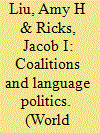

|
|
|
|
|
| Publication |
2012.
|
| Summary/Abstract |
Why is it that some governments recognize only one language while others espouse multilingualism? Related, why are some governments able to shift language policies, and if there is a shift, what explains the direction? In this article, the authors argue that these choices are the product of coalitional constraints facing the government during critical junctures in history. During times of political change in the state-building process, the effective threat of an alternate linguistic group determines the emergent language policy. If the threat is low, the government moves toward monolingual policies. As the threat increases, however, the government is forced to co-opt the alternate linguistic group by shifting the policy toward a greater degree of multilingualism. The authors test this argument by examining the language policies for government services and the education system in three Southeast Asian countries (Singapore, Malaysia, and Thailand).
|
|
|
|
|
|
|
|
|
|
|
|
|
|
|
|
| 2 |
ID:
117599
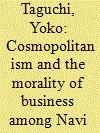

|
|
|
|
|
| Publication |
2012.
|
| Summary/Abstract |
Based on anthropological fieldwork, this article confirms that arguments about the decline of Mumbai's cosmopolitanism through the rise of regionalism and hindutva have failed to consider the idea of 'cosmopolitanism' as understood and used by local people, specifically local merchants. Reconsideration of cosmopolitanism in relation to regionalism focuses on the morality of business, as expressed by merchants in Navi Mumbai, is examined through two case scenarios. The Marathisation of signboards led by the Maharashtra Navnirman Sena (MNS) and participation in the Ganesh Festival show that their morality of business enables Navi Mumbai's merchants to adjust to various kinds of challenging phenomena, including those seen as regionalism. The same business morality, then, skillfully re-constructs the foundations of cosmopolitanism as a polyphonic folk term.
|
|
|
|
|
|
|
|
|
|
|
|
|
|
|
|
| 3 |
ID:
143317
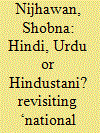

|
|
|
|
|
| Summary/Abstract |
Asking how the nationalist intelligentsia and Hindi literati sought to interact with and shape the new medium of radio in a period of time that witnessed the establishment of All India Radio’s Lucknow station in 1938, this article embeds colonial discussions of radio broadcasting into the cultural, literary and linguistic debates over Hindi, Urdu and Hindustani. The vibrant debate on the standardisation of Hindi, set against the background of All India Radio policies, is discussed from the perspective of those literary actors and institutions that envisioned diverse oral forms of Hindi and Hindustani for the rural and urban population residing in the Hindi belt and the rest of India. In addition, the article compares the radio broadcasting language to other contributions published in Hindi to show how languages operated not only in parallel but also in intersecting literary spheres. The article shows that language debates over radio broadcasting functioned as a site to probe the flexibility of what was to be officially projected as the language of the nation-to-be.
|
|
|
|
|
|
|
|
|
|
|
|
|
|
|
|
| 4 |
ID:
112061
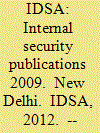

|
|
|
|
|
| Publication |
New Delhi, IDSA, 2012.
|
| Description |
402p.Spiral Binding
|
|
|
|
|
|
|
|
|
|
|
|
Copies: C:1/I:0,R:1,Q:0
Circulation
| Accession# | Call# | Current Location | Status | Policy | Location |
| 056494 | 355.033054/IDS 056494 | Main | On Shelf | Reference books | |
|
|
|
|
| 5 |
ID:
112062
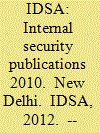

|
|
|
|
|
| Publication |
New Delhi, IDSA, 2012.
|
| Description |
268p.Spiral Binding
|
|
|
|
|
|
|
|
|
|
|
|
Copies: C:1/I:0,R:1,Q:0
Circulation
| Accession# | Call# | Current Location | Status | Policy | Location |
| 056495 | 355.033054/IDS 056495 | Main | On Shelf | Reference books | |
|
|
|
|
| 6 |
ID:
112063
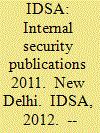

|
|
|
|
|
| Publication |
New Delhi, IDSA, 2012.
|
| Description |
264p.Spiral Binding
|
|
|
|
|
|
|
|
|
|
|
|
Copies: C:1/I:0,R:1,Q:0
Circulation
| Accession# | Call# | Current Location | Status | Policy | Location |
| 056496 | 355.033054/IDS 056496 | Main | On Shelf | Reference books | |
|
|
|
|
| 7 |
ID:
092110
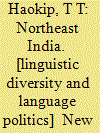

|
|
|
|
|
| Publication |
New Delhi, IDSA, 2009.
|
| Description |
24p.
|
| Series |
IDSA occasional paper no. 5
|
| Standard Number |
9798186019633
|
|
|
|
|
|
|
|
|
|
|
|
Copies: C:2/I:0,R:0,Q:0
Circulation
| Accession# | Call# | Current Location | Status | Policy | Location |
| 054563 | 305.809541/HAO 054563 | Main | On Shelf | General | |
| 054564 | 305.809541/HAO 054564 | Main | On Shelf | General | |
|
|
|
|
| 8 |
ID:
139666
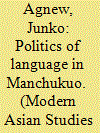

|
|
|
|
|
| Summary/Abstract |
This article explores the language politics of Manchukuo and the implications reflected in the literary texts of the Japanese writer Hinata Nobuo and the Chinese writer Gu Ding. Through the close examination of communicative failures, such as lexical misunderstandings, linguistic barriers, lies, and rumours in Hinata Nobuo's ‘The Eighth Switching Point’ and Gu Ding's ‘The Wilds’, this article illustrates the authors’ different responses to the impact of this language politics. While both authors were aware of the mutable nature of language, Hinata perceived the Japanese language as a symbol of colonial power and thus the miscommunications between Japanese and Chinese in his story address the ethnic hierarchy embedded in language in the specific context of Manchukuo. Gu Ding, on the other hand, did not see language as a defining element of the culture of a nation, and therefore tried to construct a new type of language and community that were not restricted by the discursive notions of the Chinese and Japanese nations. Gu Ding's primary concern was the modernization of his native place and, to him, adherence to traditional language forms was insignificant and deleterious.
|
|
|
|
|
|
|
|
|
|
|
|
|
|
|
|
| 9 |
ID:
074092
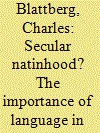

|
|
|
|
|
| Publication |
2006.
|
| Summary/Abstract |
Because of their failure to distinguish enough between interpretation and creation, scholars of nationhood have tended to neglect the role of creativity in both the genesis and persistence of national communities. Giving creativity its due leads us to question the standard conception of nations, and of the states that recognise them, as secular. This, in turn, suggests that we need to interpret the significance that language has for nationalists in a new way. After showing how, the paper concludes with an argument about what this new interpretation should mean for language politics.
|
|
|
|
|
|
|
|
|
|
|
|
|
|
|
|
|
|
|
|
|